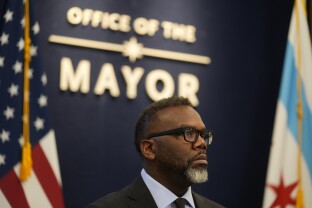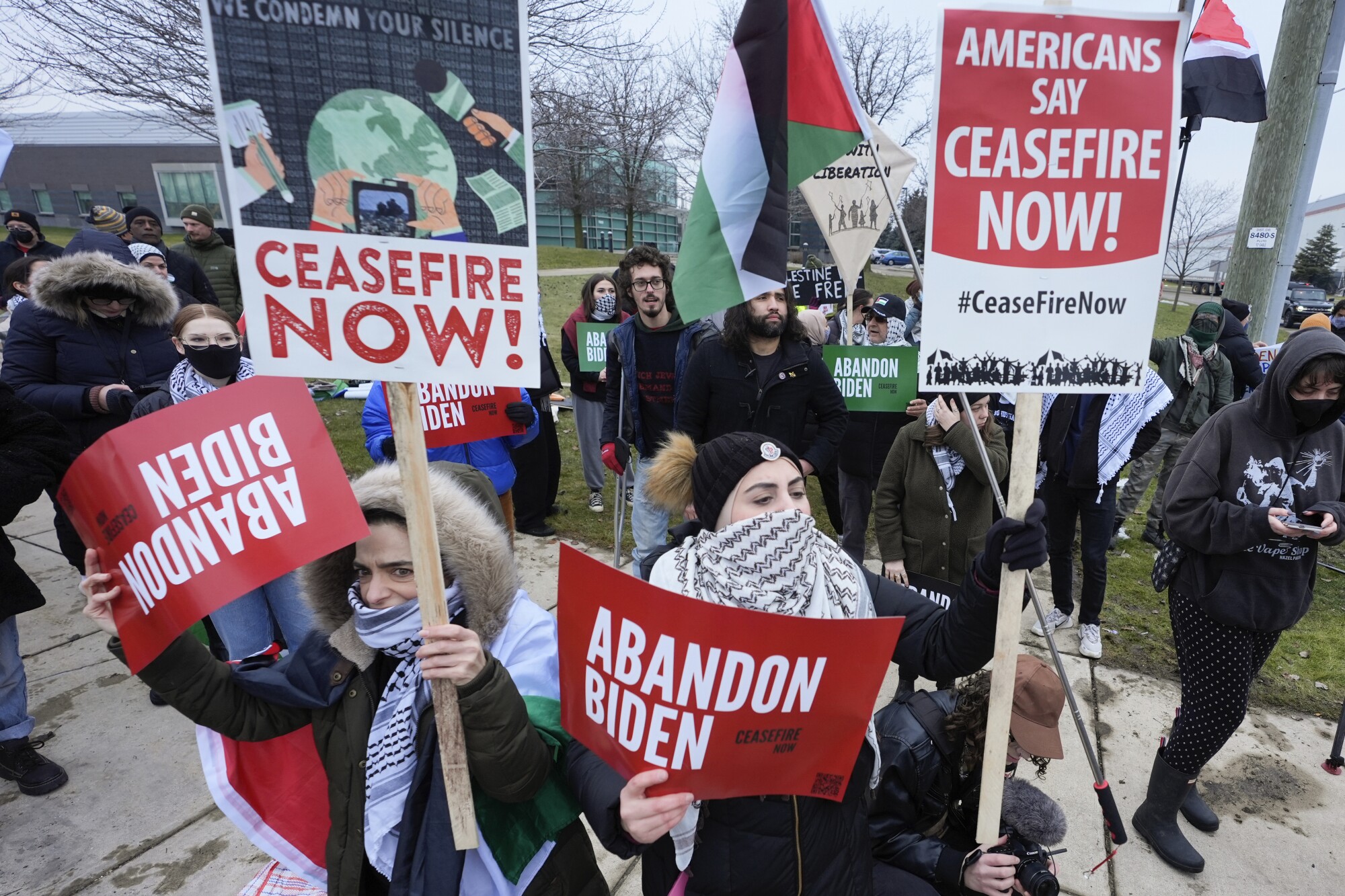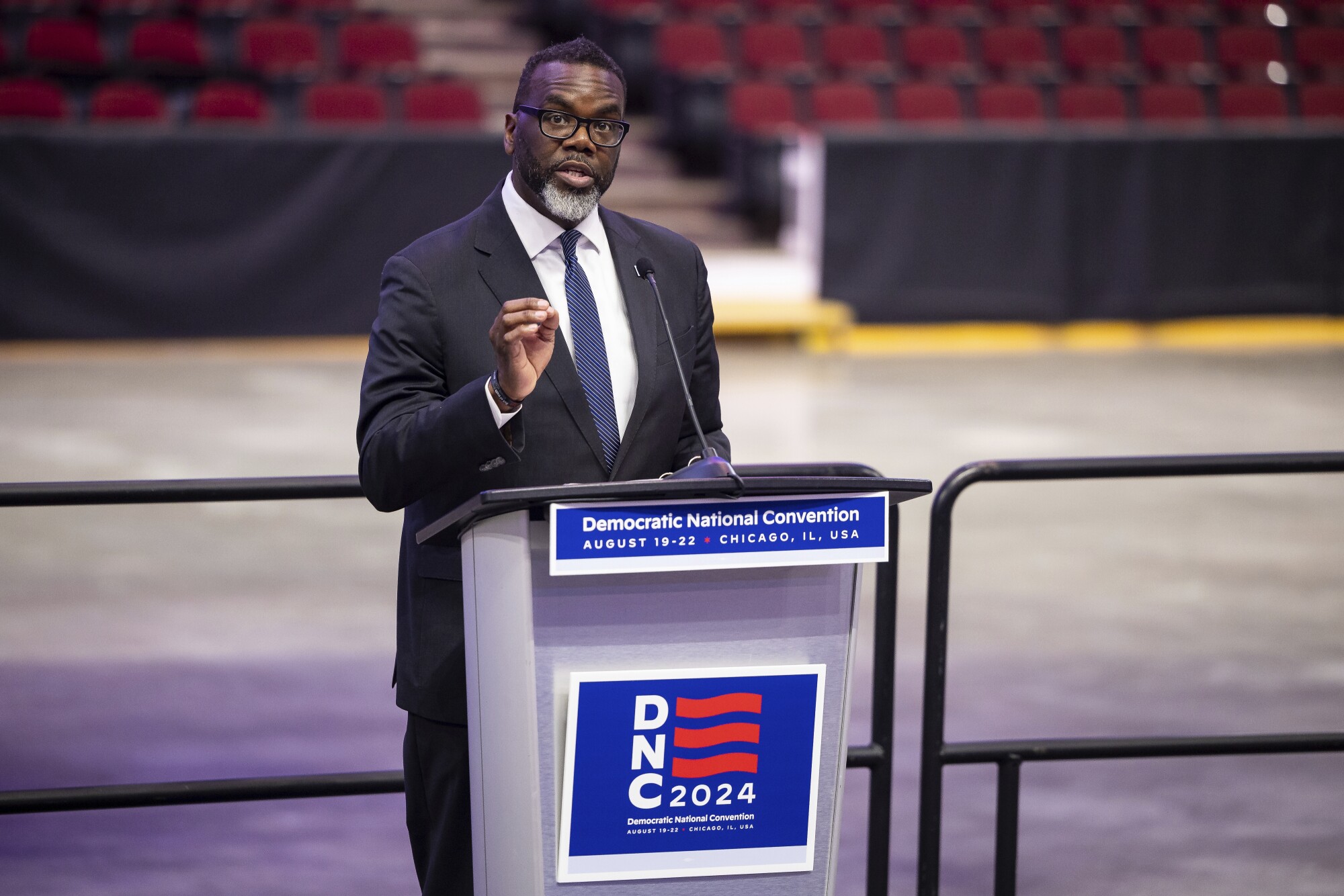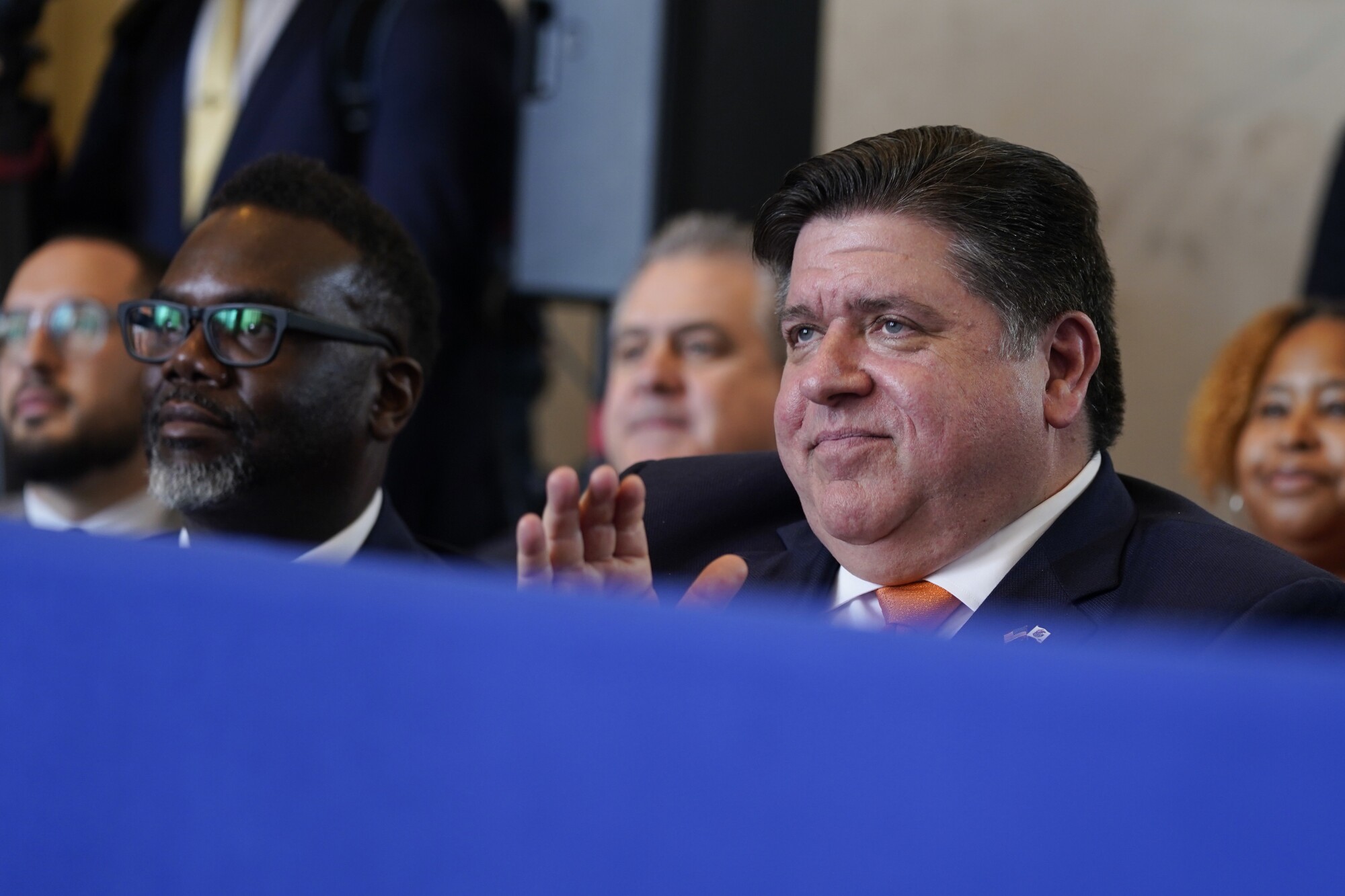Chicago Mayor Brandon Johnson’s office had been strategizing around his Kamala Harris endorsement for weeks.
Shortly after the president’s debate, Johnson met with his closest advisers and made clear that if Joe Biden did drop out, the mayor wanted to “loudly and quickly” support Harris, one source told NOTUS.
In effect, it was the start of Johnson’s venture onto the national stage, which will be punctuated by Chicago hosting the Democratic National Convention in mid-August. Amid some of the most topsy-turvy three weeks in American political history, Johnson is tasked with ushering in normalcy and calm in Democratic politics at a time that is anything but.
Many in Chicago were already unsure if Johnson was up to hosting a convention. Now, with the Democratic ticket still unsettled (despite Harris almost immediately consolidating support), and an assassination attempt on former President Donald Trump reshaping the security risks, it’s become infinitely more complicated.
NOTUS spoke with more than 30 Chicago politicians, strategists, organizers, national Democrats and friends of Johnson, before and after Biden’s decision to bow out, about the job facing the mayor in mid-August. They described the 48-year-old mayor as a charismatic and intentional man guided by faith with deep convictions about what the government should do for its constituents.
But some also described a mayor who has at times struggled to lead the United States’ third largest city. Day-to-day hiccups have left people feeling like he may not be ready for a leadership role in such an unstable moment.
“I do think that the DNC will go well, and I say that despite the mayor’s rocky first year and, frankly, in spite of the mayor, not because of him,” said Alderman Bill Conway, who some insiders think will eventually challenge Johnson for mayor. Johnson told NOTUS he is well aware of his critics. He doesn’t take the hate personally. But he firmly believes that he is ready for whatever may come.
“If you haven’t picked up on this yet, I am my toughest critic. So what people think of me, I don’t really give it much thought, honestly,” he said during a nearly hour-long interview that ranged from defiant to reflective. “I want a safe, vibrant, energetic convention. I want to show off the best parts of who we are.”
And, he says, he’s already had to answer to issues well beyond the scope of a big city mayor. Many of those issues have stumped Democrats with national platforms.
“They’re asking the mayor, the city of Chicago, what is his plan for international global population shift? As well as war?” he said. “That’s essentially what they’re asking, ‘What are you gonna do about war in international global populations?’ It sounds like they have a whole lot of confidence in a brother.”
***
Johnson, one of 10 children, born to pastors in the Chicago suburbs, models his progressivism on civil rights icon Rev. Jesse Jackson Sr. Before he was mayor, he was a leader in the Chicago Teachers Union. Before that, he was a foot soldier in the progressive movement, sporting hoodies and sneakers. He sees his own ascension as a forceful backlash to the disenfranchisement Black and brown communities in Chicago have felt for decades at the hands of Chicago’s well-documented political machine.
“The Bible says, ‘For where your treasure is, your heart will be also.’ I live by that,” he said, listing off the very Black West Side neighborhoods of Austin, where he still lives, North Lawndale, where he goes to church, and the South Side’s Roseland and Englewood, where he has reopened a mental health clinic and provided opportunities to turn vacant lots into affordable housing, respectively.
“That’s where my heart is. So that’s where my investments will be,” he said. “That’s my faith. It’s bigger than politics for me.”
He has championed progressive causes in office, including by casting the tie-breaking vote in the city council to approve a resolution calling for a cease-fire in Gaza. Two people close to the mayor told NOTUS they believe it cost him deeply with more conservative constituencies.
Moves like these have fed speculation that he’ll be more lenient toward protesters against Biden’s policies in Israel at the convention.
“Another question I would ask is, ‘What are we doing as a country to actually give voice and respond to the protest?’” Johnson said. “People are more concerned about the protests than they are about the message.”
Some organizers see Johnson on their side.
“He comes from the movement himself. He’s always been a social justice organizer. He was with the teachers union. All of those things mean that he comes with social capital to our community,” said Hatem Abudayyeh, national spokesperson for the United States Palestinian Community Network, one of the organizations applying for march permits for the convention. His conservative estimate is that at least 40,000 people will show up to march.
The mayor said his top goal is safety for both protesters and residents. People close to him said he’s spent a considerable amount of time building a coalition to coordinate a plan for any scenario between the Chicago Police, Secret Service and others.
“We’ll make sure that everyone is safe,” Johnson said. “That’s the goal. And if there’s a threat to the safety of the people of Chicago, and that includes our protesters, I’m gonna do everything in my power to ensure that their safety is maximized.”
***
There’s still plenty of fretting, including from city officials, about what could go wrong outside the convention. The assassination attempt on Trump at a rally earlier this month ramped up concerns about political violence and security.
Plans for the march against the war in Gaza remain even if Harris takes over the nomination. Then there’s the potential for Republican potential agitators; some even expect Texas Gov. Greg Abbott to bus migrants to the city as a convention-week stunt.
The city has been in constant communication with the Secret Service. John Roberson, Johnson’s chief operating officer, said that the Secret Service has not changed the security plan that’s been under discussion for months. But it didn’t rule out the force making any “enhancements” as the week draws closer.
“I think the plan that we have now is extremely good,” he said. “I have all the confidence in the world,” in their security partners, including USSS and the Chicago Police run by Superintendent Larry Snelling.
Roberson said the mayor was clear with his own team about the gravity of this convention.
“The eyes of the world are going to be on us, and the mayor has made it very clear that he expects Chicago to show up in this moment,” he said.
***
Few in Chicago expected Johnson, then a county commissioner, to run for mayor in 2023. But inside the Chicago Teachers Union, Johnson’s run was so anticipated that in 2019 when the union was interviewing mayoral candidates to determine who to endorse, at least one hopeful was asked whether they would step aside after one term and throw their endorsement behind Johnson, a source said. He won as an underdog, fulfilling the union’s political ambitions.
Now in office, the first-time executive, who came up outside Chicago’s political machine, is facing an uphill battle on many of the issues he set out to prioritize, from his progressive tax agenda to strengthening the city’s care economy. So far, his tenure has included policy wins — a $1.25 billion bond deal, paid time off for workers, summer jobs for young people, expanding access to mental health and the elimination of “subminimum wage” for tipped workers.
But he’s also suffered some major legislative losses, like a failed ballot measure that would have transferred profits from high end real estate taxes to aid homelessness. The city council also voted to overturn Jonson’s decision to end use of a controversial gunfire detection technology called Shotspotter. He also faced public backlash over his plans to move the Bears football stadium. Though many applaud some of his efforts, his critics say the bad outweighs the good.
“He’s operating within a deficit of trust,” said Aviva Bowen, a longtime Democratic strategist in Chicago. “After this year, there have been a lot of ups and downs, more downs than ups. And people’s patience is wearing thin. And when I say people, I’m counting among them his own allies.”
Johnson’s response: “There are people who are still adjusting to the fact that for the first time in the history of Chicago, you have a mayor that has no ties to the political machine in this city,” he told NOTUS.
The mayor delivers a similar message to voters.
“They’re trying to give this Black man the blues. But aren’t you glad Black don’t crack?” he said at a recent Community Benefits Agreement summit to fight displacement of working-class Black people in the long-disenfranchised neighborhoods on the South Side surrounding the soon-to-be Obama Presidential Library. “Fighting white supremacy is hard work.”
Johnson frequently boasts that he has the Blackest city hall of any mayor and that he’s made the “fifth floor” — the mayor’s office — accessible to those who never had it before, even if that’s meant traditionally powerful people have a harder time getting through.
But Chicago Democrats say there’s more to it than that.
People in city hall and Chicago insiders said that the collaboration between the “fifth floor” and the city council is too limited. Johnson’s team is too insular, and only a small number of people are in the room when decisions are being made. Some senior staff who were part of the “old guard” have left, at odds with the new regime. And Johnson’s staff are new to the city government, steepening the learning curve. Some legislation goes for a vote before enough work has been done behind the scenes to reach a deal, these critics said.
Some caucuses, including the Black caucus and Latino caucus, feel alienated over differing priorities in addressing the migrant crisis.
The business community is suspicious of the mayor at best. And at worst, they’re actively courting someone to challenge him for the next election, said one person with knowledge.
“I think that we haven’t reached what I would say is an easy gallop,” said Alderwoman Pat Dowell. “The administrative and the executive branch, we’re still feeling each other out. And so we’ve had some accomplishments, some hits and, you know, some some misses. So it’s a work in progress.”
Some have lodged harsher criticisms. Alderwoman Jeanette Taylor, a progressive and a Johnson ally, went on the “The Ben Joravsky Show” last year and said the progressive movement “should not be on the fifth floor” of city hall. “We were not ready because we haven’t been in government long enough to know how government really works.”
She stands by that assessment. Taylor cautioned that her comment had less to do with Johnson and more about the progressive movement acquiring power. “We can’t let somebody get into office regardless of who [it] is and then think that we don’t have to fight or we don’t have to justify the moves we make. I stick by what I said.”
Responding to that, the mayor said, “I don’t have to carry everyone’s position just because they are aligned with me.”
The mayor’s office has tried to make changes, including new hires to give lawmakers and the press more direct contact. Johnson has tried to hone his message. One source said he told his top aides he wants to focus on four major issues: community safety, housing, mental health and the workforce, including jobs for youth. The mayor is also trying to use more empathetic language to respond to probing press questions (one ally said Johnson’s staff was trying to shift him off of a West Side “neighborhood response”).
Those changes have led to positive strides, people close to Johnson said.
“I think there’s a method to his madness,” said Vice Mayor Walter Burnett Jr., a stalwart of Chicago politics who supported the mayor’s opponent the entire election. Johnson tapped him for the job, once he won the election, as a show of unity. And Burnett said he’s never sat with a mayor and as many alderpeople as he has with Johnson. “There are things that are not 100%, but he’s impressed me.”
People close to Johnson believe that over time, the hard-to-please residents of Chicago will be impressed too. First, he’ll have to get through the convention. And then, according to him, the next couple of decades.
“I would actually argue that I’ve been more ready for this position than the previous mayors that got here before me,” he said. “I will serve as long as the people of Chicago will allow for it, and I plan on being allowed to do it for 24 years.”
***
At a DNC media walk-through of the United Center location in May, Johnson and Gov. JB Pritzker sat next to each other briefly and shared a short conversation. The two share convention-hosting duties, but their offices have sparred over who controls what comes Aug. 19, according to sources familiar with the discussions.
It was clear to anyone watching them that they were cordial but not close friends.
In most of the tug-of-war episodes, Pritzker has won out — which some speculate is in part because he is shelling out the most money to make the convention happen.
“Pritzker is set up for anything good that happens at the convention, and Johnson is set up to take the fall for anything that’s bad,” one Chicago strategist explained.
Multiple sources said the relationship between the offices has been fraught since Johnson took office. During the runoff, Pritzker unofficially blessed Johnson’s campaign against his challenger, including by tapping into his reservoir of donors, multiple sources said. But the mayor was slow to make appointments in key places during the transition, which angered Pritzker’s office, sources in Chicago politics said. It did not lend credibility to his governing skills and made Pritzker’s team question the office’s reliability, sources said.
Others believe the tension grew because Johnson, a Black man who still lives on the West Side, did not automatically bend the knee to Pritzker and his office, which multiple people in Chicago described as an operation with sharp elbows.
Pritzker and Johnson have been in public spats over migration, proposals for a new Bears football stadium and the convention itself, leading to the perception that they just don’t get along.
“Everyone is learning a new thing, and learning new things is always uncomfortable,” said Stacy Davis Gates, a longtime friend of Johnson’s and president of the Chicago Teachers Union, a dominating political force in Chicago that Johnson once helped lead, which in turn helped him win in 2023.
“I think that if the resistance wasn’t as high to actually what a progressive can provide in executive leadership, that things would be going a lot smoother. You got to give people an opportunity to do the job,” she added.
Johnson rejected the idea that there’s tension in the relationship.
“Like any other relationship, you’re going to have conversations with people that you’re working with, and there will be, you know, ideas that will be challenged,” the mayor said in an interview. “And those ideas must be challenged because that’s how we sharpen ourselves. But I’ve enjoyed, quite frankly, my time as mayor working with Gov. Pritzker.”
Looking to silence the critics, the mayor says he’s prepared for whatever comes his city’s way at the convention.
“Everything that I do is done out of a severe sincerity. I don’t know too many Black people that wake up and not take the day seriously,” he said. “If anyone believes that [I am] not taking this mission seriously, or that somehow I’m not prepared — how dare they?”
—
Correction: A previous version of this story cited a $1.25 million bond deal. It was $1.25 billion. The story has also been updated to correctly reflect Superintendent Larry Snelling’s name.
Jasmine Wright is a reporter at NOTUS.



